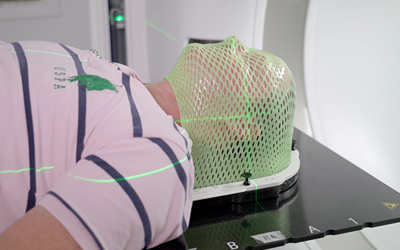
Tips for getting through treatment with a radiation therapy mask
Undergoing a biopsy is often the starting point for many patients’ cancer journeys. A biopsy is a procedure where a small sample of body tissue is taken for examination under a microscope to help specialists form a diagnosis. There are things you can do to help stay calm and positive while you wait, and it can also help to know what your expected wait time could be.
The wait time for a biopsy result will vary based on the type of biopsy and the urgency of the case, and the diagnosis will not reduce nor hamper the time it takes for the results to return. Generally, straightforward results will be ready within 1–2 days, while more complex cases can take up to 7–10 days. Additional tests may be needed after the initial examination of the sample, hence the differing time frames. However, your specialist will do their best to advise you on how long your results should take.
Biopsies for skin, bowels, prostates and lungs will generally fall within the time frame of 1-2 days, unless further tests are needed after the initial examination. Breast biopsies can present a different process and time frame. These biopsies can be conducted at a breast clinic on the same day as a mammogram and ultrasound. The doctor or a specially trained nurse will remove a small piece of tissue or a sample of cells from the lump or abnormal area, and the results are usually ready after 1 to 2 weeks.
When biopsy results come back undetermined, it means that the sample obtained during the biopsy did not provide conclusive information. If this occurs, further evaluation or additional tests may be necessary to reach a definitive diagnosis. Your specialist will discuss the next steps with you. However, these may include repeating the biopsy, considering alternative diagnostic methods, or monitoring the area of concern over time.
After receiving biopsy results, the next steps depend on the diagnosis:
Benign result: If the biopsy shows benign or non-cancerous tissue, your specialist may recommend monitoring or further evaluation if symptoms persist.
Malignant result: If cancer is detected, your specialist will discuss treatment options, such as surgery, chemotherapy, radiation, or other targeted therapies.
Undetermined result: If the results are inconclusive, additional tests or a repeat biopsy may be necessary.
Regular follow-up appointments are crucial to monitor your health and address any changes. Your situation is unique to you, so speak with your specialist for personalised advice and guidance throughout this process.
Be more informed and play an active role in your own cancer care.

The content on the Icon Cancer Centre website is for informational purposes only and should not be considered medical advice. It is not a substitute for consultation with a qualified medical practitioner. For personalised medical guidance, please consult with your GP or another qualified healthcare provider.
Discover our comprehensive collection of content designed to inform, support, and guide you through every aspect of cancer care. From the latest news and updates to personal patient experiences and educational resources, these materials provide valuable insights to help you better understand cancer, treatment options, and the journey ahead.